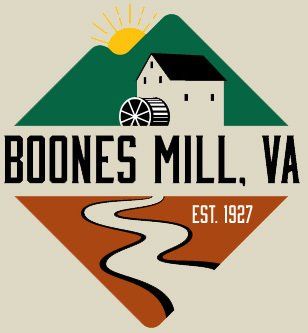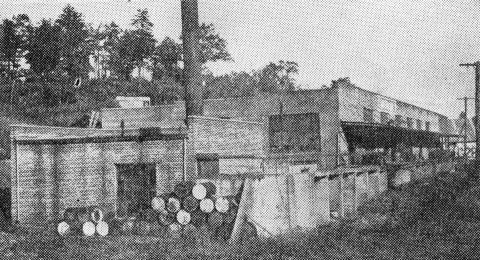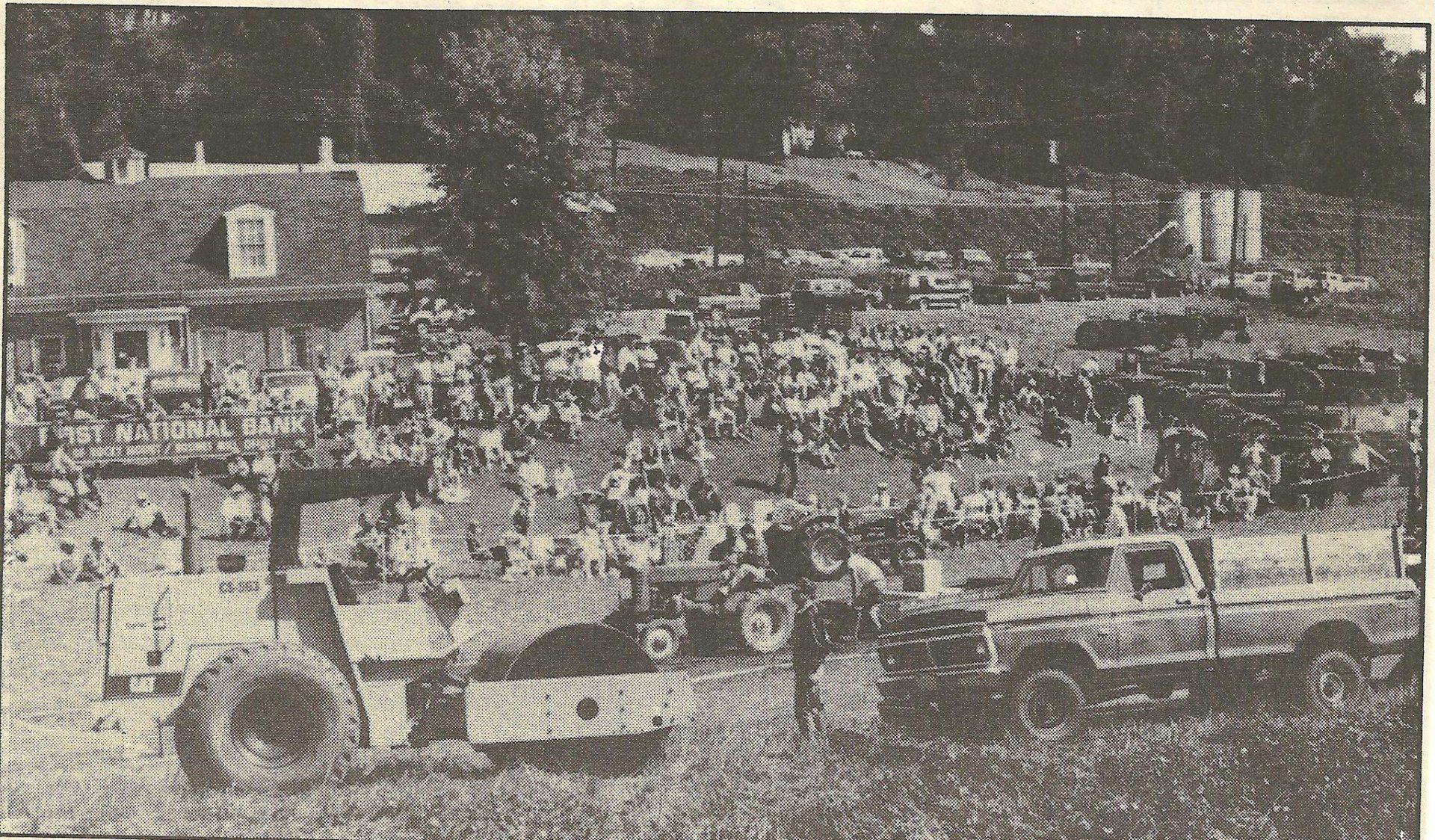Town History
“If you want to understand today you have to search yesterday.”
Pearl S. Buck, American novelist
In the 1740s, pioneers traveling by river and road from Eastern Virginia and Maryland, and Scotch-Irish and German families, coming down the Carolina Road (originally known as the Great Warrior Path), settled in what would become Franklin County, then the most western county in Virginia.
The County was formed in 1786 from parts of Bedford and Henry Counties by an act of the General Assembly. It was named for Benjamin Franklin, then Governor of Pennsylvania, where many settlers originated.
Boones Mill originally developed around the site of a mill, established by the Boon Family in 1786. Agriculture has figured prominently in Boones Mill and Franklin County’s 200-year history and was the occupation of most county residents until recent times. Tobacco was a leading crop in early Franklin County.
The nineteenth-century saw increasing industrialization. With the entry of the Norfolk and Western railroad in 1892, the Punkin Vine Route through the County and Boones Mill provided new access for industry. Tobacco factories, as well as diversified wood and textile-based industries, became significant components of the County’s economy. Boones Mill’s primary industry, North American Housing Corporation, closed in 2008. The former industrial site is being redeveloped by the Town for new businesses.
In 1927 the Town of Boones Mill was incorporated and comprised 525 acres. The Town’s boundaries have not been altered since that time.
In 2013 the Town of Boones Mill completed a survey of historic structures in the Town. The survey results and associated documentation were used as part of an application to the Virginia Department of Historic Resources for the designation of a historic district. The application was approved and district went into full affect in August 2014. There are 37 buildings and homes added to the Virginia Department of Historic Resources and the the National Register. This designation continues to open doors to some exciting future possibilities for the town and its residents including tax breaks for the restoration of historic properties, tourism marketing, and national recognition. The Town will help with outreach to ensure that property owners are fully aware of incentives and opportunities related to the historic designation.
The three articles below are from the Wednesday, January 1, 1986 issue of the Franklin News-Post.
Town Was Incorporated In 1927
By Ron Brown
Staff Writer
Franklin News-Post
Wednesday, January 1, 1986
BOONES MILL - Since its incorporation on April 11. 1927, Boones Mill bas been a tiny town with some sizable problems.
The lack of municipal sewage and water systems has been on the minds of town leaders almost since the town's inception. Those same leaders have had to wrestle with increasing demands for trash collection and fire protection in the town.
As of 1985, many in the town feel town government has failed to deal effectively with those problems. A history of the town gathered from town council minute books might bear out that belief.
Under its original charter the name of the town was Boone Mill. The name of the town was changed in 1942 to Boones Mill after the town council requested the Virginia General Assembly to do so.
The town derived its name from an old mill built many years ago, owned and operated by a man named Boone, a descendent of Daniel Boone.
According lo the charter, E.L. Blankenship was the first mayor or Boones Mill after being ratified by the town council. The original council members were J.M. Emswiler, C.O. Murray, M.T. Sink, T.A. Flora, L.A. Bowman and L.M. Bussey.
Under the charter, the mayor was the chief law enforcement officer for the town. He served as a justice in civil cases involving $1,000 or less. He also served as the judge in misdemeanor cases and fines were paid lo Boones Mill.
The first ordinance passed by the new town council made it unlawful for owners of horses, cows, fowls, hogs or any other animal to deposit animal carcasses within one-half mile of the town limits. The owner of the animal could be fined up to $25 for a violation.
The first speed limit for the new town was eight miles an hour for cars turning corners, going around curves or traveling in a school zone. The general speed limit was 15 miles an hour.
Another ordinance passed by the new council made "fighting, whooping and cursing" unlawful within the town limits.
The town council also made it unlawful for women of general bad character for lewdness or immorality to linger or loiter upon the streets. It also was against the law to run a wheelbarrow on the streets of Boones Mill.
In February of 1929, the town council proposed it sell or grant a franchise for electricity for the town. Appalachian Power Co. was the low bidder for the service with a bid of $5.
In May of 1929, the town council voted to install, ten 100- candle power streets lights in the town.
In an election in June of 1929, J.W. Kinsey became the first elected mayor of Boones Mill. The councilmen elected in 1929
were C.L. Dillon, C.B. Flora, J.O. Angell, W.D. Abshire, T.A. Flora and M.T. Sink.
On Sept. 15, 1930, council appointed a three-member committee to study a proposed water system for the town. In
January of 1931, the town put $500 on certificate of deposit for the future construction of the water system.
Shortly after his election in June of 1931, Mayor S.S. Guerrant Jr. was instructed by council to check the town's firefighting equipment and buy four dozen buckets if necessary. In October of 1931, J.O. Angle became the town's first fire chief.
In November of 1931, the town council appointed a three-member committee to investigate building a town hall.
In December of 1931, the town council made it unlawful to allow chickens, bulls, goats and other animals to run loose on the streets of Boones Mill. Al the same meeting, the council decided to outlaw reckless driving in the town.
In March of 1932, the town council voted to continue the salary of town sergeant W.R. Abshire at $7.50 per month and pay him $1.50 every time he took a prisoner to Jail In Rocky Mount. Abshire's duties included looking after the town fire truck and making rounds on Saturday and Sunday.
In April of 1932, Guerrant resigned as mayor of Boones Mill. G.C. Turman was appointed by council to fill Guerrant's unexpired term.
In June of 1933, Turman won re-election to the mayor's post. In November of 1933, town council instructed him to apply with the federal Public Works Administration to build a modern water system for Boones Mill.
The council also voted to apply to the Civil Works Administration for $2,000 to build sidewalks along the main street or Boones Mill.
In December of 1933 the town council set the following waler rates: $1 for the first 2,000 gallons; 40 cents for the next 3,000 gallons, 30 cents for an additional 3,000 gallons; and 20 cents for any water used over 8,000gallons.
At the same meeting council established a $1 annual tax for any male over the age of 21.
In September or 1935, L.M. Bussey became mayor of Boones Mill.
In November or 1935, the town council voted to encourage town residents to build sanitary toilets.

In May of 1936, town council asked the town clerk to investigate the legality of reimbursing land owners for chickens killed by dogs.
In perhaps the most scandalous event of early Boones Mill a town police sergeant was sentenced to two years in jail after shooting a man who had attempted to flee from him.
The town council outraged by the court's decision asked Virginia Governor George C Peery to pardon officer W.R. Harden.
"it is the opinion of the council Mr. Harden was innocent of any intentional wrongdoing," council wrote Peery in a letter. Harden was charged in connection with "the fatal shooting of Harry Taylor, a 25 year old negro," reported the Franklin News-Post on June 25, 1936.
According to the newspaper Taylor was shot on May 17, 1936, after his automobile left the highway almost in the heart of Boones Mill and plunged down a 15-foot embankment.
"Sheriff Harry B. Lee was told that the officer fired to scare the negro," the newspaper reported. Officers found four empty shells in the gun but Taylor had been struck once with the bullet penetrating his liver.
Harden was defended in the case by B.A. Davis, Sr. and B.A. Davis, Jr. of Rocky Mount.
in January of 1939 council appointed a three-member committee to study the need for firefighting equipment in the town. In February of 1939 council asked Councilman Jack Garst to confer with Norfolk and Western Railway about helping pay for the equipment.
In May of 1940, the mayor was given authority to authorize use of the town fire truck as he saw fit and to set the price for use of the truck. Council said the truck must answer all fire calls and the mayor could decide for what else it could be used.
The town budget in 1941 called for expenditure of $1,980.
In August of 1942 council voted to try and get a doctor to locate in Boones Mill.
In March of 1946 the town council made it unlawful to build any building in town without a building permit.
In November of 1946 town council made it unlawful to have an outhouse near any mill stream in town. Council also made it unlawful to dump sewage in the streams. Council gave homeowners 30 days to comply with the law. The next month however council put off enforcing the ordinance until March 19, 1947.
Following a series of delays town council called for a cost study on the town's water and sewer needs in July of 1947. The council said a budget would be drawn up for the project.
In November of 1947 town council authorized the town Sergeant to remove the siren from the town fire truck and put it on his patrol car.
In October of 1948 town council entered into an agreement with A.H. (Buck) Garst for Garst to provide water for a town water system. Garst was to receive 20 percent of the revenue from the system and the town was to receive 80 percent.
In November of 1948 the town council authorized J.E. Murray to put in the pipe for the town water system.
In September of 1949, L.C. Jamison became mayor and remained in the job until he was succeeded in September of 1951 by L.K. Bussey.
In November of 1953 the town established a rate of 40 cents a week or $1.60 a month for garbage collection.
On March 30, 1955 town council discussed the possibility of an automobile license tax for the town. The tax was approved in December of 1957.
On May 17, 1955 town council complained to Air Force officials about low flying jet aircraft flying over Boones Mill. When the Air Force answered council in June the council complained that the Air Force had reviewed the complaint hastily.
In August of 1955 town council discussed the possibility of getting a furniture factory in town. In November of 1955 Giles Lambert appeared before town council and expressed his appreciation to council for cooperation in getting Lester Brothers - Continental Homes to locate in the town.
Mayor L.K. Bussey resigned effective January 1, 1956. On January 18, 1956, L.R. Buchanan was named mayor to succeed Bussey.
In September of 1959 Jack Garst became mayor. In June of 1960 Garst reported to council that the total value of all real estate in the town was $105,000.
In 1960 the construction of a shopping center in Boones Mill was underway.
On January 22, 1966 Jack Garst resigned as mayor of Boones Mill. In June of 1966 R.L. Morter was appointed by council as mayor to serve out Garst's unexpired term.
In September of 1967 J.E. (John) Murray took over as mayor.
Murray and council attempted to get a sewage treatment plant built just east of town on 18 acres of meadow land belonging to the family of William B. Poff, Jr. But the Poffs, in an attempt to stop the project filed suit in late 1982 in saying that the federal Environmental Protection Agency had violated its own guidelines by not conducting an environmental impact study before okaying the project.
The EPA subsequently conducted an environmental assessment of the project and the Poff's withdrew their suit.
Murray was succeeded in office in June of 1984 by Francis McNeil the first woman to serve as Boones Mill's mayor. McNeil worked for a compromise plan for the sewage plant which would place part of the facility on land owned by Marley-Continental Homes and part of the system on 2.2 acres of the Poff land. The payoffs agreed to sell the property.
In September of 1984 the town virtually ran out of water due to low pressure in its water system. Water had to be hauled in the town by truck.
In November of 1985 Boones Mill citizens rejected a bond referendum that would have provided the town $100,000 for construction of a municipal water system.
Boones Mill Noted for Apples
By T.W. Rickard
Staff Writer
Franklin News-Post
Wednesday, January 1, 1986
BOONES MILL - Apples, and everything that goes along with their growing, harvesting, and consumption, seem to make their way into the lives or most or the residents or Boones
MiIl.
It's not surprising. The northern end or the county, where Boones Mill is located, is a prime apple-growing area and the town is virtually surrounded by orchards.
Homer Murray, a lifetime Boones Mill resident, has traveled extensively throughout the country with his wife, Frances. Time and again, the Murrays would run across festivals in towns around the country, held to celebrate something special or unique, such as a day, a season or ... a crop.
After seeing and attending some of these festivals, it occurred to Murray, why not an apple festival in Boones Mill?
"I figured if they can have a potato festival in Iowa, why couldn't we have one for apples in Boones Mill?" he says.

Murray, 77, came up with the idea eight festivals ago. 1t was obviously a good one.
The annual Boones Mill Apple Festival has grown into one of the most popular and anticipated events in Franklin County.
Though it has remained essentially the same since its conception in 1978, the festival has grown steadily in popularity. Last year, the crowd for the one-day event was estimated at around 6,000, the highest ever.
"I never thought it would grow to the proportions it did," Murray said. "We've got just about as many as we can handle right now.''
From the beginning the Boones Mill Lions Club has sponsored the festival. Murray, who has been the chief organizer every year, is a Lions Club member. He said the cooperation from various civic groups in the town has been outstanding.
"Cooperation is the name of the game," he said. "It's been almost unbelievable.''
Organizations such as the Boones Mill Volunteer Fire Department and Rescue Squad, the Wednesday Morning Service Club, the Friendship Club and the three churches in the town have worked every year to make the festival a success.
Cooperation has even been great from outside the town, including Norfolk and Southern Railroad, whose tracks run through the town.
The first year, Murray said, the festival parade was forming
and had straddled the tracks when a train moved into the town. As parade marchers scrambled to move out of the way, the train went into an emergency stop. It stopped in time, fortunately, and no one was hurt.
The next year, Murray called Norfolk Southern and requested a "slow order" be given to trains moving through the town on festival day.
To his surprise, NS officials offered to go him one better and stop train traffic altogether for four hours, from 2 p.m. to 6 p.m., during the festival. Murray quickly agreed.
Later, while wailing for a haircut in a Rocky Mount barber shop the morning of one festival, Murray overheard two men talking about train schedules.
"We can't go out this afternoon," one man joked, "They're making apple butler in Boones Mill."
Through all the cooperation and all the people, the festival has annually made a good profit. A large chunk of the money, Murray says, goes to charily through the Lions Club.
"We ask each organization to donate 20 percent of its profits," he says. "It's sort of an honor system, and I can honestly say we've never been short-changed. Everyone contributed their fair share."
The Lions donate money to the Eye Bank, which is a longtime Lions Club charily, and to needy school children who need but cannot afford eyeglasses.
The town volunteer fire department and rescue squad also receive funds from the festival, which they count on to help stay in operation.
"Last year, for the first time, the festival included a carnival with rides, mostly for children. Other than that, and an art show competition that was added the second or third year for the festival, things have stayed the same," Murray said.
In that way, the festival is unique. It is simple and relaxed, not contaminated by the hokum that sometimes ruins such operations when they try to grow too large.
"It has turned into a sort of homecoming," Murray says. "People plan lo come back to Boones Mill on festival weekend to see old friends and visit family."
For the bicentennial, Murray said the festival will be bigger than ever, possibly stretching over three days. No definite plans have been made yet, but the search for a grand marshal will begin soon.
In the past, the festival has been host to a number of notable political personalities, including Gov. Charles Robb, U.S. Senators Paul Trible and John W. Warner and Congressmen Dan Daniel and Jim Olin.
"We have to start planning in February to get a grand marshal for the parade," he says. "But (newly-elected Governor) Jerry Baliles and his wife, Jeannie, promised to be here if he won."
Murray says this year's festival might be the last one for him, though his wife says he should make it to the tenth anniversary of the festival next year.
"If it wasn't for Frances, I couldn't do it,'' he says.
"I'm his secretary," she says happily.
Whether he stays with it or decides to pass the responsibility on lo someone else, Homer Murray has spawned and nurtured a Boones Mill tradition that will no doubt continue indefinitely. And that is something of which he is most proud.
"The festival is a good thing for the community because it gets people working together," he says.
And there has never been any trouble, no one drinking or acting rowdy, Murray says.
"One fella was asleep under a tree and the sheriff went over to wake him. Thought he was drunk, Murray says. "Turns out he was just sleeping."
Such is the charm of the Boones Mill Apple Festival, as relaxing, year after year, as it is enjoyable.
Jacob Boon Established Mill Along Maggodee Creek
By Ron Brown
Staff Writer
Franklin News-Post
Wednesday, January 1, 1986
BOONES MILL - In 1782 Jacob Boon, the founder of Boones Mill, found tiny Maggodee Creek a perfect site for his milling operation and home.
So the first cousin of settler and explorer Daniel Boone began construction of "Locust Lawn," which is reputed to be the oldest house in the present Town of Boones Mill.
The mill itself was located several hundred feet from the house , which lies along Easy Street in Boones Mill. The old Boon Mill no longer exists but an oil painting of the mill hangs
in the living room of Locust Lawn.
The house was built of chestnut logs with much chinking. It has a rock foundation and chimney.
And the present day owners of the house, the family of John Hatcher Ferguson, found the original rock fireplace behind a smaller fireplace constructed during an earlier remodeling of the house.

The 18th century portion of the house consists of a mud cellar, the present living room and two upstairs bedrooms. Ceiling beams in the cellar and bedrooms are original as is the rock foundation and chimney.
The back portion of the house, clapboard, tin roof and double porches were added in the mid 19th century.
The latest restoration of the house look place in 1966 by the
Ferguson family.
The Boone family in America began with George Boon Ill and his wife, Mary Maugridge, natives of Devonshire, England and
members of their Society of Friends, who emigrated to the
Colony of Pennsylvania in 1717.
George Boon III, son of George Boon II and Sarah Uppey, was born in Stoak Devonshire, England, in 1666.
George Boon Ill and Mary Maugridge arrived in Philadelphia on Oct. 10, 1717 and finally settled in Exeter Township in Berks County. George Boon Ill died there on Aug. 7, 1744.
The couple had nine children including Squire Boon, Father of Daniel Boon, and Joseph Boon, father of Jacob Boon, the founder of Boones Mill.
Jacob Boon served in the Revolutionary War as a private.
During the Revolutionary War, Jacob Boon continued to keep his home plantation in Frederick, Md. until after the year 1779. At the close of the war he was living in Bedford County of which a part was made into Franklin County in 1786.
















